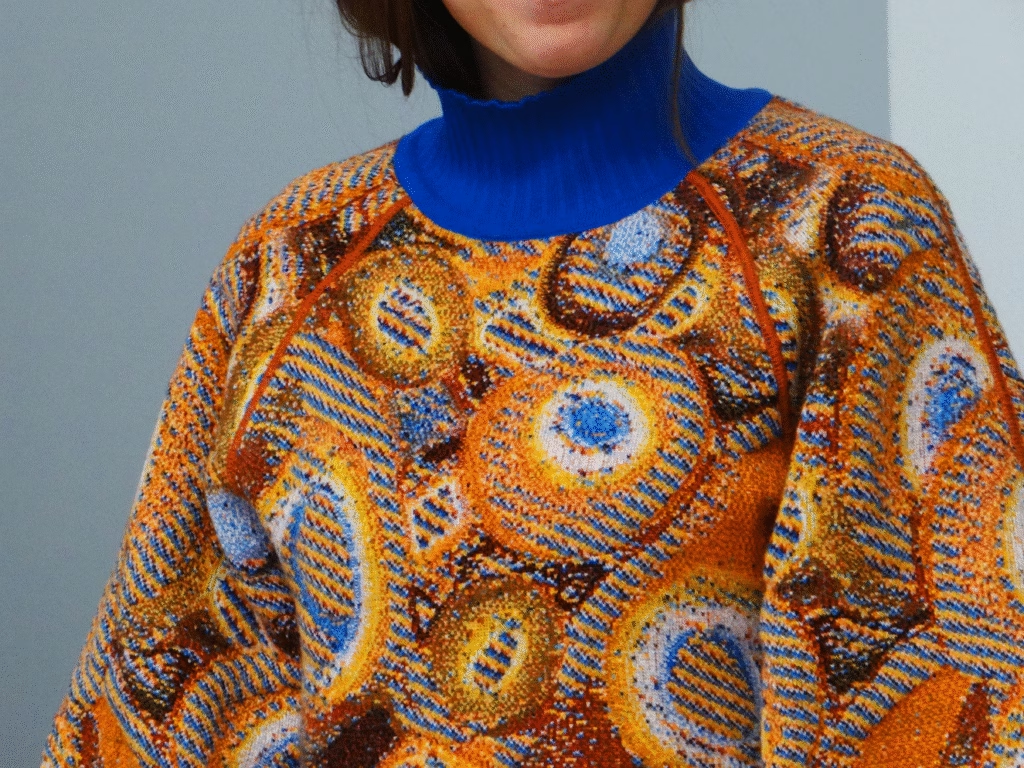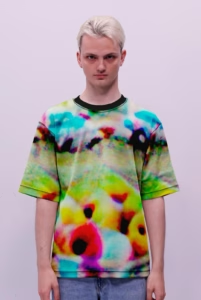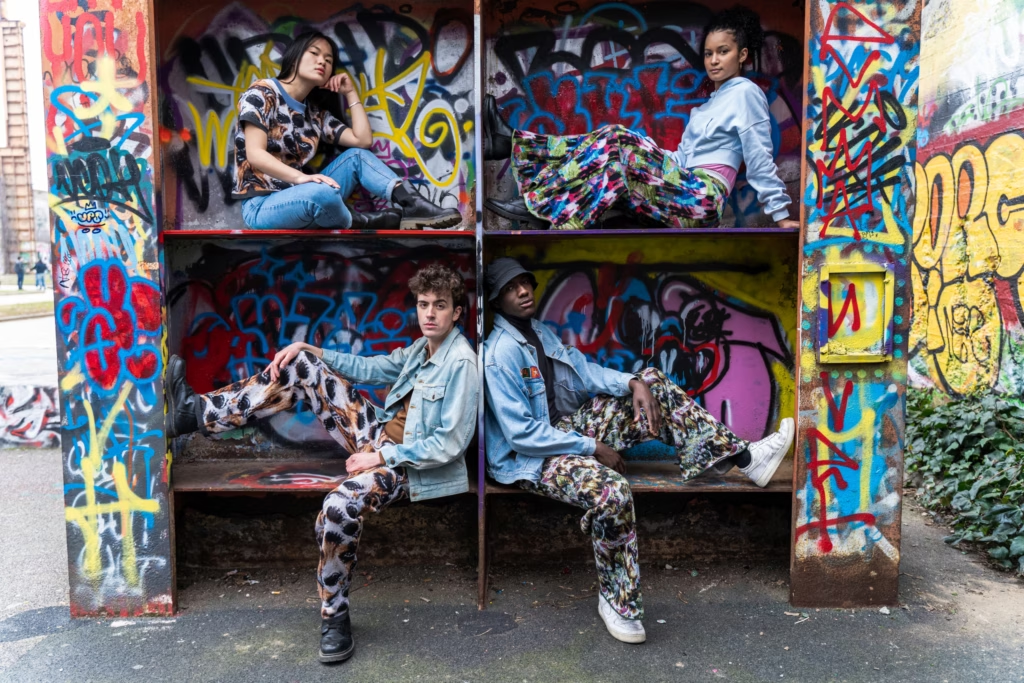It’s January 2019, and a man walking through London notices live facial recognition cameras set up by the Metropolitan Police. He’s taking the most convenient route to his destination, and rerouting would add extra time to his journey. To avoid being scanned, he covers his face, only to be promptly surrounded by officers and fined for disturbing the public order.
This incident highlights the growing tension between daily life and constant surveillance. Citizen advocacy groups have dubbed incidents like the London encounter and other similar events “authoritarian” and “Orwellian.” But since then, the stakes of citizenship have only grown. Authorities typically view covering your face—even to protect your identity—as suspicious. But what if your clothing alone could fool cameras into seeing a giraffe, teddy bear, or orange, helping you evade biometric data collection?
This technique is called adversarial fashion, or “clothing designed to disrupt automated surveillance systems, such as facial recognition technology (FRT).” It’s becoming increasingly important in a world where governments detain and imprison people for exercising their rights or simply for their identity, whether they suspect you to be an undocumented immigrant or Palestinian.
Surveillance is intensifying, too. The widespread use of FRT in China immediately brings the 2002 film Minority Report to mind. The U.K. is rolling out live FRT that matches biometric data to police watchlists in real time, yet the country offers few protections for citizens. In the U.S., at least 15 states and municipalities limit or ban FRT. Yet FRT remains widely used across the country, for airport security and other law enforcement purposes.
Here’s the problem: Although FRT has led to valid arrests, it collects public data indiscriminately, regardless of a person’s criminal history or behavior. This is a serious red flag for human rights. That’s where Cap_able comes in. CEO and founder Rachele Didero launched the Italy-based startup in 2022 to promote adversarial fashion as a way to resist surveillance in the digital age. The name Cap_able reflects the company’s mission: Collaboration, Awareness and People. She first got the idea in 2019 while attending the Fashion Institute of Technology in New York.
“My friends and I were discussing how a Black community in Brooklyn was fighting their landlords’ efforts to put facial recognition cameras around their apartment complex. I remember feeling shocked that the technology existed,” Didero tells CONE over Zoom.
When authorities use FRT to infringe on human rights, Didero says it falls to citizens to protect their “precious” biometric data. “I can change my name, but I cannot change my fingerprint—or faceprint,” she says.
“In the digital world, we have the opportunity to say yes or no to cookies. But in the physical world, we might not even know there’s a camera,” Didero adds. “It should be our right to opt out, but we can’t. The challenge was how to create physical protection that is also legal. We wanted to create something that gives people the possibility to make the choice ‘no.’”
Cap_able’s patented “AI camouflage” technology uses AI algorithms to embed digital adversarial patterns into knitted designs, crafted entirely from a single yarn. Together, these 100 percent Italian-made pieces form the award-winning Manifesto Collection, which includes unisex garments such as wide-leg pants, crew shirts, hoodies and long-sleeve dresses.
The startup’s six-person team tests the collection’s effectiveness using the computer vision program YOLO (You Only Look Once), a popular software for person-object detection. They are also developing designs to fool other FRT systems.

Didero explains that adversarial patterns act like the opposite of a QR code, which scans to reveal information. YOLO uses a bounding box to identify characteristics of people and objects (videos are available on Cap_able’s site), and assigns a percentage, such as “85 percent dog confidence.” Cap_able’s patterns alter the pixels within the bounding box, giving wearers “more chances to confuse the camera and protect your biometric data,” she says.
Cap_able has also addressed the well-documented racial bias in FRT. Didero says that because “the adversarial patterns act on how the algorithm processes visual features, not on skin color,” they help wearers evade detection “regardless of skin tone.” It is important to note that these garments provide 360-degree protection when the entire body is in frame, though cameras can still recognize people when only their face is in the frame.
The Adversarial Fashion project has a similar concept, with clothing that helps wearers to be identified as a license plate instead of a person.
Since Cap_able launched, the state of data privacy has shifted. Its biggest markets are in the U.S., Canada, and the European Union, but perceptions of the threat vary by region. In the EU’s 27 member states, which are collectively debating the landmark AI Act, residents sometimes “take this protection for granted,” says Didero—even though some member states have tried to circumvent existing regulations.
In the U.S. and U.K., which have more diverse populations, there are numerous reports of people being misidentified or subjected to abusive treatment. “I would say the U.S. public is much more aware of this technology,” Didero says. “We are deeply aware of the racial biases embedded in many AI systems, which is exactly why inclusivity and the protection of vulnerable communities are core to our mission.”
In this landscape, why doesn’t everyone have an identity-protecting garment? Cap_able was designed as an ethical brand that prioritizes traceability, fair compensation, and participation in the Better Cotton Initiative, Didero says. These commitments make garments more expensive, creating a price barrier for many customers.

Cap_able has taken a big step toward making its garments more accessible with the “AI Camo T-shirt”. The first 100 pieces of the certified-organic cotton jersey became available in July 2025 through a limited presale. The t-shirt achieves up to “75 percent orange confidence” from YOLO.
“We’ve developed a new textile technology that builds upon our patented system but is optimized for a different category of garments,” Didero explains. “Whereas our previous pieces had to be made in knitwear to ensure adversarial effectiveness, this new version works on lighter, printed fabrics, allowing us to design a t-shirt that’s more cost-effective to produce, while maintaining the same AI-resistant properties.”
The new garment was launched as part of a gaming-themed Instagram campaign, featuring short videos that unfold the tale of DataArkhia. “[It’s] our speculative framework exploring privacy and identity, and the idea of clothing as a ‘shield,’ emotionally and technologically,” says Didero. The campaign casts viewers as players tasked with finding a code to save humanity. They navigate a dystopian world shaped by the unchecked surveillance of “Big AI.” In this world, each of the nine Manifesto Collection garments is reimagined as a core virtue (like Koi, Demi and Kyton, the new tee) with unique characteristics to help restore balance.
Didero envisions people wearing the more affordable jersey “during moments of collective visibility, like protests or public demonstrations.” Citing reports of Hungary using FRT to target Budapest Pride participants, she says Cap_able’s work carries “pressure” and responsibility.
To evolve alongside surveillance technology, Cap_able requires ongoing, critical research. “You need a lot of computational power, time, and money to change the algorithm,” Didero says. “A garment may not always protect the wearer’s identity, but what we’re trying to communicate will still be there.”
In other words, the clothing remains a colorful statement of self-expression that raises awareness about the right to blend in—and stand out.
Byline: Chloé Skye W
Photo credit: Marcello Chiesa | Marta Morini | Eugenio Chironna

